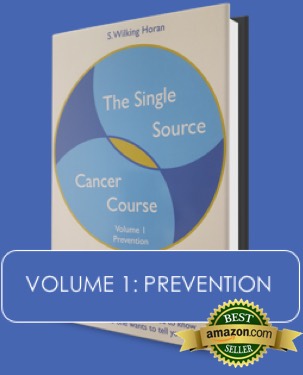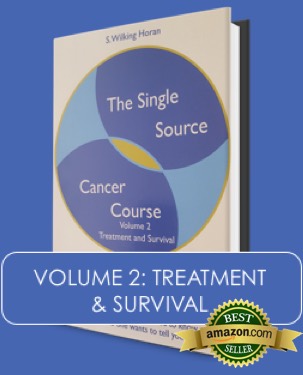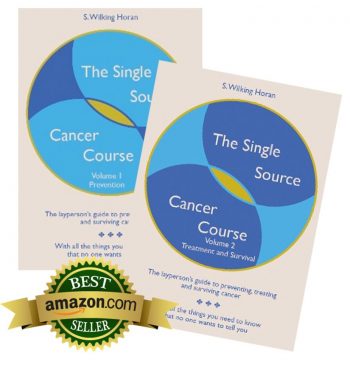
As I mentioned before, when I was diagnosed with my first cancer — colon cancer — I was a very young, athletic, slim, non-smoking vegetarian. Of course, it caught me completely by surprise. Little did I know at the time that the disease ran in my family. And, I was petrified. Making decisions in the midst of total panic is not the most efficient or effective way to make decisions. And, I was determined to never feel so completely helpless and hapless again. So, when my health allowed, I began to study. I did my homework. I researched. I compiled information. And, over the years — in spite of two additional diagnoses of skin and breast cancer — I began to teach and counsel others.
But, here’s the problem. There is so much information out there about cancer. Literally, truckloads exist. When people like you and I need answers, it’s impossible to know where to begin. And, I have found that too much information is much more difficult to deal with than not enough. The trick is to understand what information is essential to the cancer process. We must then separate the excess from the necessary — and distinguish the facts from the fiction. It must then be distilled and reduced to its essence — and presented in a user-friendly source that is comprehensive without being cumbersome.
So, first and foremost that was my goal. To write books that would fulfill those needs and simplify the cancer process for others. Divided into Two Volumes, PREVENTION and TREATMENT AND SURVIVAL, these books are the result of years of personal experience, years of personal research and years of listening to and counseling others. They are the culmination of my experience, my skills as an attorney and my knowledge of psychology to produce a one-stop-shopping guide to all things cancer and its many related issues. They are handbooks, really. “How To” books written by one ordinary person for the benefit of other ordinary people. They are the CANCER ROAD MAPS from diagnosis to survival. They are, indeed, the books I wish I had when I was first diagnosed with cancer.
Yet, just as important as WHAT THESE BOOKS ARE, is WHAT THESE BOOKS ARE NOT. They are not advertisements. They are not endorsements. In them I do not advocate one cancer treatment over another or one scientific study over another or one course of action over another. I do not present information that reflects one school of thought over another. While I do present information upon which the most respected medical organizations and publications the world over appear to agree, I also present information that is in controversy and scientific findings that are contradictory. Because, there are many experts on cancer and not all of them are in agreement — and findings that state one thing today will often state something completely different tomorrow.
To that end, I have done my best to present a comprehensive Layperson’s Guide to preventing, treating and surviving cancer as we understand it today. I am not a doctor. I am an ordinary person who has spent much of her adult life living first-hand with the challenges of the cancer process. In addition to my own personal experiences, I have utilized the most reliable sources available and have distilled their vast oceans of information into the pages of my books. I simply present this information and ask my readers to reach their own conclusions. For if I advocate anything, it is that each individual be as fully informed as possible. I advocate that each individual takes full responsibility for her or his own personal life and health. I advocate that each individual become proactive rather reactive. And, I advocate that each individual makes her or his own decisions based upon thorough research, consultation and analysis.
You see, I’m a firm believer in the adage, “EXPERIENCE IS THE BEST TEACHER.” I’ve been down this road before. Indeed, I’ve been down this road three times. I know the way. I can help shed light on the path and illuminate the darkness. I can help one navigate the terrain, avoid the wrong turns, negotiate the detours, anticipate the pitfalls and sail over the obstacles. I’ve already jumped through all the hoops. And, my intent is to help others on the same road. My goal is for others to learn from my mistakes and to benefit from my experience.
IF YOU WANT TO PREVENT CANCER
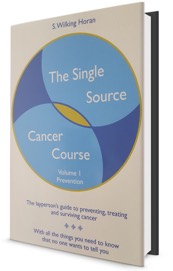 IF THIS IS YOU – Volume 1 of the Single Source Cancer Course is your Handbook to Cancer Prevention: 101. In this Volume we begin by discussing the history of cancer, what it is, how it begins and why. We discuss our deep-rooted fear of the disease and the many misconceptions that surround it.
IF THIS IS YOU – Volume 1 of the Single Source Cancer Course is your Handbook to Cancer Prevention: 101. In this Volume we begin by discussing the history of cancer, what it is, how it begins and why. We discuss our deep-rooted fear of the disease and the many misconceptions that surround it.
Once the ice is broken, we explore the field of statistics and research studies so that we might develop a better understanding of all the cancer information that surrounds us and learn to separate fact from fiction by applying simple common sense. We discuss the known risk factors of cancer — which are presented in 13 DIFFERENT CATEGORIES – and the major cancers that these factors implicate.
Now, having this information allows us to assess the possible cancers for which we are at risk. I call this section of Volume 1 “THE LAYERING EFFECT.” Here you will learn how to objectively analyze your potential cancer risk AND how to avoid, decrease or mitigate that risk. And, of course, Volume 1 would not be complete without a thorough discussion of the most common screening and detection procedures for the most common cancers.
For Prevention, of course, is our First Defense against cancer and personal responsibility is a must. We must monitor our own health and well-being in a proactive way. We must be diligent. And, we must take advantage of every tool that is available to us and incorporate these tools into our regular healthcare routine.
IF YOU’VE BEEN DIAGNOSED WITH CANCER
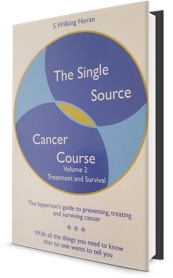 IF THIS IS YOU – then skip Volume 1 and move directly to Volume 2 of the Single Source Cancer Course: Treatment and Survival. In Volume 2, we discuss a diagnosis of cancer and a variety of the cancer surgeries and treatments that may follow. Not only do we examine these surgeries and treatments, we are extremely frank in discussing the problems they may create and the ways in which one may prepare for, avoid or mitigate such problems.
IF THIS IS YOU – then skip Volume 1 and move directly to Volume 2 of the Single Source Cancer Course: Treatment and Survival. In Volume 2, we discuss a diagnosis of cancer and a variety of the cancer surgeries and treatments that may follow. Not only do we examine these surgeries and treatments, we are extremely frank in discussing the problems they may create and the ways in which one may prepare for, avoid or mitigate such problems.
We explore the roles of both patient and medical personnel, the importance of these relationships, as well as the patient’s legal protections and privacy rights. We discuss the financial aspects of cancer including insurance, disability, employment rights and other legalities. We examine the differences among treatment facilities, hospital billing practices, clinical trials and the resources through which one may find additional help.
In Volume 2, we punctuate each section with personal notes and anecdotes from me and a variety of news headlines to drive our points home and hone our analytical skills. And, we’ll emphasize the importance of personal responsibility and the necessity of thinking for oneself throughout.
Moreover, we discuss the many issues one will face as she or he makes the transition from cancer patient to cancer survivor. We discuss the necessary follow-up programs that one must adhere to and the many issues that may surface. For surviving cancer is not only a matter of physical well-being, it also is a matter of emotional, social and financial well-being.
And YOU are a COURAGEOUS CANCER SURVIVOR!
VERY IMPORTANT!
Now, it’s VERY IMPORTANT TO NOTE that just because you practice cancer prevention techniques – doesn’t mean you will never get cancer. Even the most careful and diligent person can still receive a cancer diagnosis during their lifetime. And, this does not mean that your preventive measures have failed. Rather, as you will learn, this is because we may not be able to avoid some of the cancer risks on our LIST OF 13. For example, if we have a genetic predisposition to a particular cancer – in other words a hereditary cancer that runs in our family – our best efforts may not protect us. In my case, for instance, each of my three cancers was highly determined by my heredity.
BUT ALWAYS REMEMBER, if we know our potential risks and are practicing good cancer prevention techniques and exercising our common sense the likelihood increases that any cancer that develops will be caught early. And, when a cancer is caught early the chances of treating it effectively increase dramatically.
PREVENTION IS OUR FIRST DEFENSE – EARLY DETECTION IS OUR SECOND!
Coaching Options

Here are the different ways I can support you:
After many years of meeting with other patients, talking with them, encouraging them and counseling them as a FRIEND and FELLOW CANCER SURVIVOR & THRIVER, I’m so HAPPY to say I am now able to connect with YOU on a very personal level – from any distance — through the very Tried & True Technology of the Telephone. In this easy way, we can communicate and discuss the topics that are so important to Patients and Family Members everywhere.
I have combined my 20 years of experience and knowledge of the CANCER PROCESS with my training from the Internationally Recognized CTI – COACHES TRAINING INSTITUTE – to help YOU find YOUR way through the maze of decisions and issues you now may be facing.
As your COACH, there are two different ways we can accomplish this:
INDIVIDUAL COACHING
Private one-on-one conversations. I like to think of these sessions as very casual talks that take place in my “virtual” living room. They are so similar to the time I spend sitting around the house discussing health issues that are important to my friends. These sessions are conducted over the phone and while I don’t time them, they typically run 30 to 40 minutes. They provide the perfect opportunity for discussing issues related to the Cancer Process that are important to you in a non-threatening and completely relaxed atmosphere.
These conversations give you the chance to raise your concerns, pose your questions and ask advice from one who has spent the last 20 years figuring out the answers. In them I will help you find the answers you seek, help point you in the right direction and help you decide upon your course of action. I will listen, I will understand, I will help you focus and I will “virtually” hold your hand as together we help YOU DECIDE what step to take next on your Journey to Recovery and Health. And you choose the frequency with which you would like to participate – weekly, bi-weekly or once every 3 weeks.
SMALL GROUP COACHING PROGRAM
Sometimes, people like to share information with others in a group setting. Sometimes, people are just more comfortable when others besides themselves are included in a conversation. Sometimes, people want to share their experiences with others. And, sometimes people just like to listen rather than talk. In these cases, I am happy to offer a SMALL GROUP PROGRAM in which 4 to 6 people come together on one phone call to me – and we discuss our common issues together as Friends and Confidants.
We know each other on a first-name basis only. And, we spend about an hour supporting one another and helping one another through the maze of cancer-related issues that may trouble or concern us every day – be they physical, emotional, financial or anything else that may pop up. These topics will be pre-determined by me with your feedback and may include anything from Diet Strategies, Chemotherapy & Radiation, Family Relationships, Treatment Side Effects, Complementary & Alternative Medicine, Legalities and Ways to Navigate the Medical Community in general. The Group meets about once every 3 weeks – subject, of course, to the availability of each Group Member.
****
In this way, YOU can choose the setting that makes the most sense for you. And, whichever you choose, you will always have my undivided attention – my 20 years of experience – and my promise that I will do everything I can to GUIDE YOU and COACH YOU throughout your PERSONAL JOURNEY TO WELLNESS!
WITH MUCH LOVE, WISHES FOR YOUR GOOD HEALTH & GRATITUDE!
